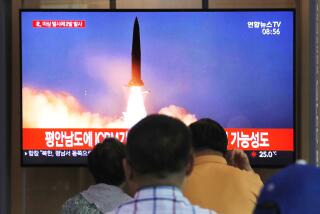Iraq’s Neighbors Warn U.S. on Long-Term Presence
Increasingly defiant over America’s aggressive new posture in the Middle East, Iraq’s neighbors signaled Friday that they will not accept a long-term U.S. role in Iraq and threw their collective weight behind Syria amid its tensions with the United States.
Calling the U.S. and British troops in Iraq an “occupying” force, foreign ministers from the eight surrounding nations declared that they “do not intend to accept any interference in the internal affairs of Iraq” and warned the U.S. against exploiting Iraq’s oil resources except under the direction of a legitimate Iraqi government.
In an unusual show of unity that marked the first regional forum after the Iraq war, nations as diverse as Saudi Arabia, Turkey and Iran unanimously called on U.S.-led forces to withdraw from Iraq as soon as an Iraqi government is established. They also rallied to Syria’s defense against any threatened sanctions by the U.S.
A joint resolution expressed “disagreement” with U.S. allegations against Syria, which have included complaints that the government in Damascus is sheltering senior members of the Iraqi Baath Party regime and providing haven for terrorist groups and that it possesses biological and chemical weapons.
“We reject utterly any accusations and threats against Syria, because this will lead to a vicious circle of wars and turmoil,” Saudi Foreign Minister Prince Saud al Faisal said in the conference’s opening statement.
“Our region has suffered more than its share of wars and turmoils over decades that have exhausted its resources and delayed its development. It cost it a lot in material and human resources.... We should try to make the war in Iraq the last of these turbulences.”
The final declaration also endorsed Syria’s initiative at the U.N. Security Council to establish the Middle East as a zone free of weapons of mass destruction -- an implicit call for Israel to give up its nuclear weapons if Arab states are asked to disarm.
Foreign ministers from Bahrain, Syria, Kuwait, Egypt and Jordan also joined in the declaration, reached after more than six hours of talks in a gilded palace in the midst of an artificial oasis in this desert capital.
The talks began at Saudi Crown Prince Abdullah’s private ranch outside Riyadh, where guests dined on roast lamb, rice and raisins before taking a motorcade of black limousines to the palace.
The talks come at a time when regimes in the Middle East are growing increasingly worried over U.S. claims that the fall of Saddam Hussein has ushered in a new era of positive change in the region.
The focus on Syria has many convinced that the U.S. will turn next to Iran, Egypt and Saudi Arabia, whose regimes are not as brutal as Iraq’s but which share a similar lack of public participation and an increasing trend in their populations toward Islamic militancy.
“They are rallying behind Syria because they fear they are next: Egypt, Iran, Libya, even Yemen maybe,” said A.A. Alabdul Hai, a political science professor at King Saud University. “It depends on the outcome in Iraq. If the Americans build a model in Iraq of a democratic regime, and if they really succeed in this, all the other regimes around here will have to shape up or ship out.”
For many Arabs, the new rhetoric in Washington over Syria provides “proof, coming after Afghanistan and Iraq, that [President Bush] is hell-bent on an anti-Arab, anti-Muslim crusade,” Saudi Arabia’s Arab News said this week. “A Middle East, no doubt, where everyone does what they are told by Washington.... No way. The Middle East will not be remade by the U.S. in accordance with its diktats.... He can forget it if he hopes to beat the Arabs into obedience.”
“Syria should not be left alone to face the crisis being woven around its neck,” added Egypt’s leading government daily, Al-Ahram.
“There must be an urgent and extensive Arab initiative to study the Iraq experience, not only to protect Syria, but to stop the American plan that is now moving like a knife through butter.”
Still, although the declaration passed by the foreign ministers was firm on insisting that the U.S.-led forces maintain security and stability in Iraq and work toward the “early administration of a broad-based and fully representative government in Iraq,” the resolution did not spell out any collective steps for enforcing these aims.
It set no timetable for how soon U.S. and British forces should withdraw from Iraq (“as quickly as possible,” Saud said), and it did not hold out any consequences for an extended coalition military presence. It did not, for example, declare that Middle Eastern governments would not recognize an interim military government in Iraq, although Egyptian Foreign Minister Ahmed Maher hinted at that.
“We cannot accept a military government,” he told reporters during a break. “There is an occupying authority which has responsibilities according to the Geneva Conventions. It must preserve security and order, to give the people it occupies the basic living needs and to respect their civil rights. But for there to be a military government, this is something I can’t imagine anyone will accept.”
Iranian radio on Friday carried comments suggesting that regional cooperation of the kind envisioned in this week’s meeting opens “extensive possibilities” for the region.
“In addition to the political lever at their disposal, they have economic resources, including oil and security possibilities,” the broadcast suggested. “On the whole, a vast dynamism can be created to compel America to put on the brakes in many spheres.... It is important that the regional states should appreciate their own might and possibilities.”
Iranian Foreign Minister Kamal Kharrazi was more muted in his comments at Friday’s meeting.
“We certainly would like the Americans to withdraw from Iraq as soon as possible,” he said. “If the United Nations is there, certainly they can take care of their own future.”
More to Read
Start your day right
Sign up for Essential California for news, features and recommendations from the L.A. Times and beyond in your inbox six days a week.
You may occasionally receive promotional content from the Los Angeles Times.






